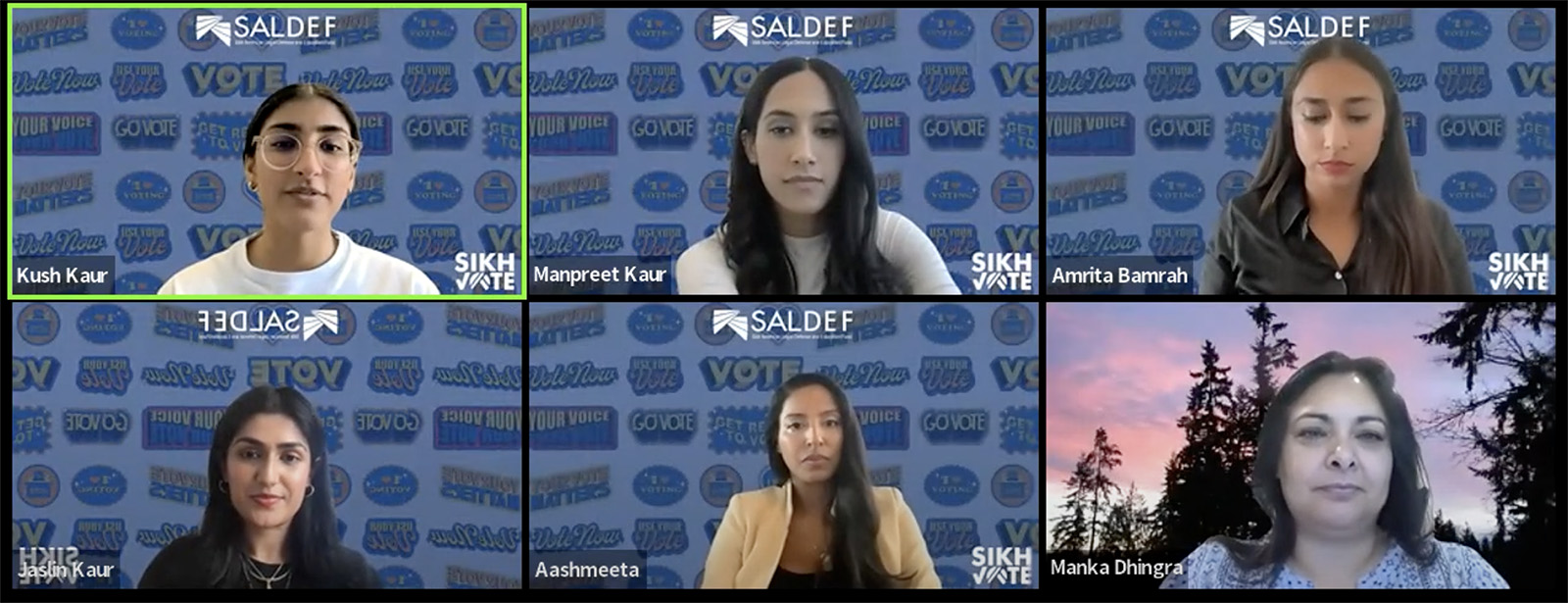At ‘Kaur Power Hour,’ Sikh women get out the vote
(RNS) — The Sikh faith has a long history of political activism in India. On National Voter Registration Day Tuesday (Sept. 17), Sikh women drew on that legacy to encourage their community in the U.S. to vote in the upcoming presidential election.
Amrita Bamrah, executive director of Dasvandh Network, a nonprofit fundraising platform based in the Sikh value of giving, spoke to more than a hundred “Kaurs,” or Sikh women, for “Kaur Power Hour,” an online event hosted by the Sikh American Legal Defense and Education Fund.
“Our ancestors didn’t wait for change, they made it,” Bamrah told those gathered online. “And today, in that same spirit, our vote is one of the most powerful tools that we have to really continue that legacy.”
Kaur, the surname or middle name taken by most Sikh women through marriage to a Singh, or Sikh man, was as much of a catchy webinar title as it was a call to action. Sikhism, also called Sikhi, is an Indic faith native to Punjab, India, that teaches scripture from the Guru Granth Sahib.
“We are a part of a history just woven with angles of those who stood up for justice, equality and the rights of individuals,” Bamrah said. “Our faith is built on these principles of courage and compassion and time and again, when we look at history, our community has risen to confront oppression, to uplift those who were silenced, and to create change where it was needed.”
The organizers of Kaur Power Hour said in the U.S. there is still work to be done to politically motivate the community. Though Sikhs can be found “truly everywhere,” reaching out to women is especially crucial, said Jaslin Kaur, Sikh organizer and former Queens City Council candidate.

Jaslin Kaur addresses the Kaur Power Hour virtual event, hosted by the Sikh American Legal Defense and Education Fund. (Video screen grab)
“Unfortunately, campaigns already don’t reach out to Sikhs enough, but they sure don’t reach out to Sikh women,” she said to the audience. “I think it’s our job as fellow sisters to reach out behenji (sister) to behenji and ensure that our fellow Sikh women are registered and ready to vote.”
The Power Hour, said SALDEF’s executive director, Kiran Kaur Gill, had a twofold objective: getting as many Sikh Americans as possible registered to vote and emphasizing how important Sikh women are in the national conversation.
As the oldest Sikh advocacy organization in the nation, SALDEF has led a voter education program called SikhVote for over a decade. Directly after 9/11, many Sikhs — especially those wearing turbans and other outward signs of their faith — were racialized and attacked over their misperceived Muslim identity. That galvanized many Sikh Americans to get involved in the political sphere. Sikhs organized especially for issues of religious freedom, hate crimes and workplace discrimination, including the protected ability to carry a kirpan, or Sikh sword, and the right to wear a turban in the U.S. military.
But according to Gill, while Sikh women are incredibly involved with their cultural, social and religious leadership, they have not necessarily been at the forefront of political engagement.
“We noticed that with phone banking, one of our volunteers mentioned that when he would call and ask about voter registration, sometimes, you know, women would hand the phone over to their husband,” she said. “And so, we are trying to say: ‘No, you know, this conversation is for everyone. Everyone has the right to vote and should exercise that right.’”
There are an estimated half a million Sikh Americans in the U.S., and the number continues to grow, according to the Sikh Coalition, a nonprofit advocacy group. But civic participation has been hampered by language, citizenship status and a feeling among some members of the religious minority that their voice doesn’t matter.

Kush Kaur, top left, speaks during the SALDEF “Kaur Power Hour” virtual event. (Video screen grab)
Reaching the largely immigrant sangat, or Sikh fellowship, at their gurdwaras has been a key mission of SALDEF. Connecting U.S. political engagement with the Sikh value of seva, or service, has been especially rewarding for grassroots organizers such as Kush Kaur, Texas native and Sikh American National Youth Council Southern chair.
“I remember when an elderly uncle approached my table who had been a U.S. citizen for over a decade, but had never voted, believing his voice wouldn’t matter,” she told the audience. “But after a conversation about the power of each vote and the importance of Sikh representation, he was eager to begin his voting registration process and to tell his grandchildren about our conversation.”
The organizers believe that with this presidential election, the stakes are especially high.
“When Donald Trump won, I was really concerned for the future of this country, because we had just elected a man who brags about sexually assaulting women, a man whose rhetoric has resulted in having some of the most increases in hate crimes in our country, and a man who made fun of people with mental health issues,” said Manka Dhingra, the first Sikh woman elected to the Washington state Legislature. She started her career as a prosecuting attorney, overseeing issues of domestic violence and sexual crimes that she said more commonly affect women of color.
“For our national election, I am concerned that misogyny will rear its ugly head, and we cannot let it,” she said. “We have to make sure we trust women, we believe women, and we are going to follow the lead of women, because we know that when women are elected, they elevate everyone.”
More Sikh women than ever have been elected to political offices, noted Manpreet Kaur, the city councilwoman of Bakersfield, California, where Punjabi is the third most spoken language and the economy mirrors the agricultural society of Punjab.
“Kaurs are leaders, both in the home and clearly in governance as well, and that’s very important, because I also watched Kaurs lead within my own household and within my gurdwara,” Manpreet Kaur said, telling the story of her nani, or grandmother. “I don’t know anyone who was as excited to vote as my nani when she obtained citizenship. But it was more exciting to see my nani actually be able to read her own voter information ballots and information packets in Punjabi.
“That was a moment that will always stand out to me, because it really built on the history about the Kaurs before me and the Kaurs that are going to come beyond me,” she added.
Mayor Neena Singh of Montgomery Township, New Jersey, is the first Indian and Sikh woman elected to that post in her state. She spoke about the excitement she sees among Sikh youth. Finding a place of belonging, especially amid hateful rhetoric and ignorance, she said, is easier when there is representation in place.
“I think when we are in leadership, we have such an opportunity to empower not just our own community, but to let others know who we are and what we stand for, because I think that helps not just us, but our kids, and that’s the reason representation matters,” Singh said.

Comments are closed.